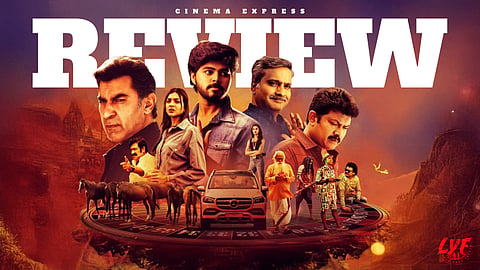LYF review: A decently engaging attempt weighed down by outdated ideas
LYF - Love Your Father movie review(2.5 / 5)
In a landscape dominated by larger-than-life commercial Telugu cinema, LYF – Love Your Father attempts an old recipe with a few solid ingredients. It doesn’t jump straight into a brawl or glorify its protagonist as an invincible hero. Instead, it patiently builds a touching father-son relationship, keeping raw emotion at the core. The film takes its time, allowing the bond between Siddharth (Sri Harsha) and his father Kishore (SP Charan) to breathe. In a market where heroes often turn into demigods within the first ten minutes, it is genuinely refreshing to see a protagonist who evolves, rather than being handed heroism on a platter.
Director: Pavan Ketharaju
Cast: Sri Harsha, SP Charan, Kashika Kapoor, Rhea Singha, Praveen, Shakalaka Shankar
LYF revolves around Siddharth (Sri Harsha) and his doting father Kishore (SP Charan). Kishore performs final rites for unclaimed orphan corpses, believing that a dignified farewell is the ultimate act of kindness. Their peaceful life takes a dark turn when a ruthless gambling kingpin falsely implicates Kishore in a doping scandal involving racehorses. Determined to clear his father’s name, Siddharth embarks on a path of revenge.
Director Pavan Ketharaju weaves a narrative that isn’t afraid to dwell on death, final rites, and the philosophy of Shiva. The film’s spiritual undertone, rooted in Kishore’s noble ritual and the symbolic setting of Varanasi, adds thematic weight. This isn’t just a revenge drama; there’s a meditative undercurrent about life’s unpredictability and the only certainty it offers: death. If one is willing to overlook its flaws, there’s an interesting film buried somewhere beneath the surface.
But that’s where LYF stumbles; it never fully realises its potential. The film is too caught up in an old-school commercial template that dilutes its ambition. For every compelling moment of intimacy between father and son, there’s a tired trope waiting to derail it. The villain feels like a relic from the '90s, and the conflict—centred around horse betting—lacks freshness or urgency. The screenplay tries to balance sentiment with mass appeal, but the result is uneven.
SP Charan emerges as the film’s strongest asset. He brings warmth and gravitas to the role of Kishore, grounding the film with an authenticity that feels inherited from his legendary father, SP Balasubrahmanyam. His role anchors the film emotionally, making the father-son dynamic feel genuine. One wishes the film spent more time delving into their relationship instead of getting lost in unnecessary subplots. Sri Harsha, making his debut, is serviceable. While he is yet to acquire the screen presence of a seasoned actor, his portrayal of Siddharth as an ordinary boy learning to fight back adds a layer of believability to the film. It’s a relief to see a protagonist who doesn’t start off as an all-powerful force but instead grows into his strength.
The film’s biggest misstep lies in its misplaced attempts at humour. Praveen and Shakalaka Shankar, despite being seasoned comedians, fail to land a single memorable gag. Their forced humour feels out of sync with the film’s emotional depth. The film would have been far more gripping had it fully embraced its darker and serious side. Instead, the jarring shifts in tone make it hard to stay invested. Had they gone with a more emotionally compelling approach, the film’s theme would have stood out more.
On the technical front, Mani Sharma’s background score lends the film an old-school commercial charm, elevating several dramatic moments. His ability to use diverse instruments to create a vintage soundscape works well with the film’s themes. However, the songs don’t carry the same magic; the lyrics feel too simplistic, failing to leave a lasting impact. Shyam K Naidu’s cinematography is surprisingly lacklustre. Given the film’s philosophical ambitions and rich locations, the visuals deserved more thought. The framing often feels uninspired, and at times, you wish the camera spent more time on SP Charan, whose expressive face alone could have added more emotional depth.
On the brighter side, LYF takes its time before introducing action. There are no unnecessary fight sequences until the climax, a rarity in mainstream Telugu cinema. The film earns its final confrontation rather than forcing it. But by the time we reach the finale, the impact is somewhat lost. The predictable twists and an all-too-familiar resolution leave you with a sense of dissatisfaction.
Overall, LYF – Love Your Father is a well-intentioned film that doesn’t fully deliver on its promise. It has moments of genuine warmth, particularly in its depiction of the father-son bond, and flirts with interesting themes of death and fate. But it lacks the narrative conviction to tie everything together seamlessly. Mani Sharma’s music and SP Charan’s presence provide some redemption, but the film needed a more serious tone, sharper execution, and fewer outdated commercial detours. As it stands, it’s a decent one-time watch, but far from the emotional powerhouse it could have been.

